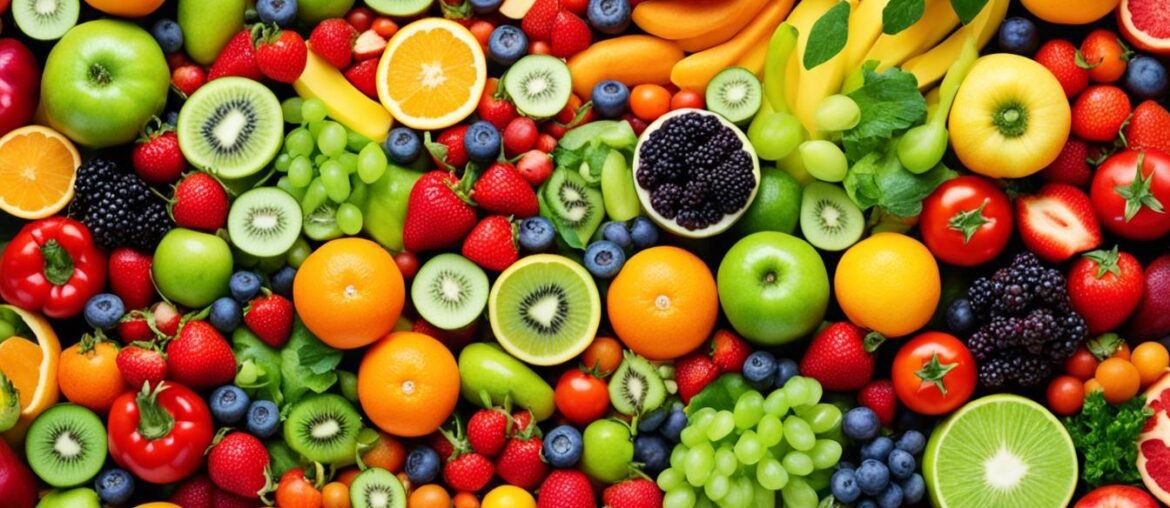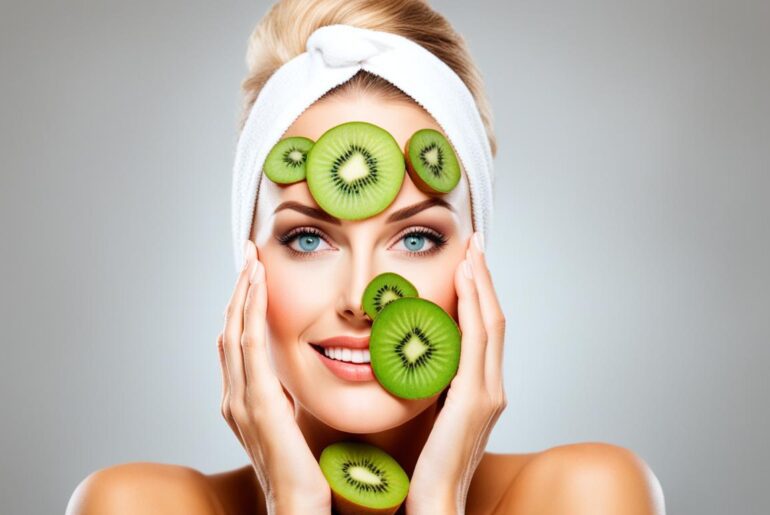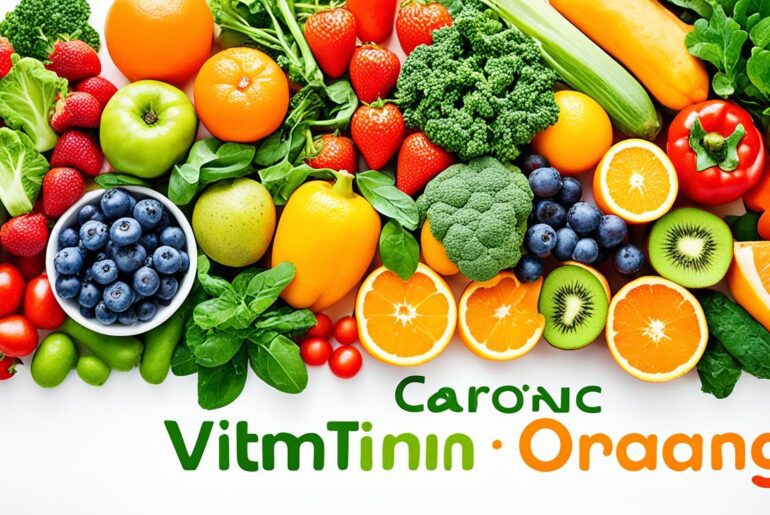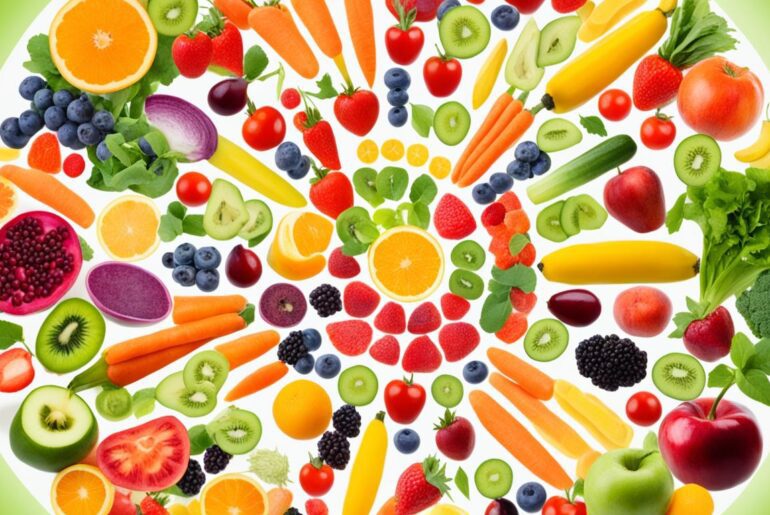As we age, our skin undergoes changes that visibly impact its appearance and health. Many individuals seek out various skincare products and treatments to combat these signs of aging. However, have you ever wondered if there is an alternative solution to promote youthful skin from within?
In this article, I will unveil the power of recommended vitamins for antiaging skin care and their potential to slow down the aging process. We will explore the benefits of essential vitamins such as selenium, vitamin E, and vitamin C, which have been scientifically proven to protect against skin damage caused by sun exposure and combat the signs of aging. Get ready to discover how these vitamins can play a significant role in maintaining your skin’s youthful glow.
Key Takeaways:
- Selenium, vitamin E, and vitamin C are powerful antioxidants that can protect your skin from the damaging effects of the sun.
- Vitamin E plays a crucial role in preserving cell membranes and reducing damage caused by sun exposure.
- Vitamin C is essential for repairing free radicals and preventing them from causing damage to the skin.
- Curcumin, EGCG, collagen, CoQ10, and boosting NAD+ levels also offer potential benefits for antiaging skin care.
- Ensuring an adequate intake of these vitamins and nutrients through diet or supplementation is key to maintaining healthy, youthful skin.
The Power of Selenium
Selenium is a mineral that plays a crucial role in antiaging skin care. Its numerous benefits include protecting the body against skin cancer caused by sun exposure and preserving tissue elasticity. Recent animal studies have shown that both oral and topical forms of selenium provide protection against oxidative damage caused by UV radiation.
Selenium’s ability to defend against skin cancer is particularly noteworthy. It acts as a powerful antioxidant that neutralizes harmful free radicals, reducing the risk of cellular damage and mutations that can lead to cancer. By safeguarding the body from the harmful effects of the sun, selenium acts as a natural ally in the fight against skin cancer.
Furthermore, selenium helps maintain tissue elasticity. As we age, our skin loses its natural elasticity and begins to sag, contributing to the formation of wrinkles. Selenium supports the production of proteins that are essential for maintaining the skin’s firmness and suppleness, helping to delay the signs of aging.
While the benefits of selenium for antiaging skin care have been established in animal studies, more research is needed to confirm these findings in humans. Nevertheless, the existing evidence is promising and underscores the potential of selenium as a valuable addition to antiaging skincare regimens.
“Selenium acts as a powerful antioxidant, protecting the body from skin cancer and preserving tissue elasticity.”
Forms of Selenium for Skin Protection
Selenium can be obtained through diet or supplements. Foods rich in selenium include Brazil nuts, seafood, lean meats, whole grains, and dairy products. However, it can be challenging to achieve optimal selenium levels through diet alone, making supplementation an attractive option for many individuals.
Topical formulations of selenium are also available, offering targeted protection against oxidative damage caused by UV radiation. These formulations can be applied directly to the skin, allowing selenium to penetrate deeply and provide localized benefits.
It’s important to consult with a healthcare professional before starting any selenium supplementation regimen. They can help determine the appropriate dosage based on individual needs and ensure any potential interactions with medications or existing health conditions are taken into account.
| Benefits of Selenium for Antiaging Skin Care | How to Obtain Selenium |
|---|---|
| Protects against skin cancer | Include selenium-rich foods in your diet, such as Brazil nuts, seafood, lean meats, whole grains, and dairy products. Consult with a healthcare professional for selenium supplementation. |
| Preserves tissue elasticity | Consider topical selenium formulations for targeted benefits. These can be applied directly to the skin. |
| Acts as a powerful antioxidant |
Vitamin E for Skin Health
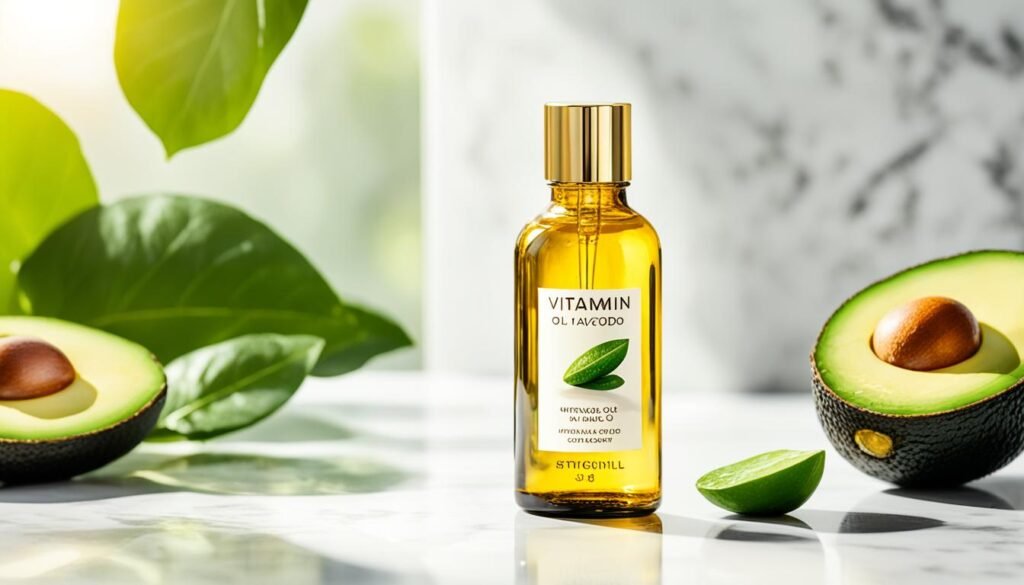
Vitamin E is considered the most important antioxidant for skin health. It plays a crucial role in protecting our cell membranes and preventing damage to the enzymes associated with them. This powerful antioxidant is known for its ability to combat the harmful effects of sun exposure and reduce the risk of skin damage.
Studies have shown that applying vitamin E topically can provide significant benefits for the skin. It has been found to reduce damage caused by sun exposure and limit the production of cancer-causing cells. By protecting cell membranes, vitamin E helps maintain the integrity of our skin barrier and prevents oxidative stress, which can accelerate the aging process.
Vitamin E supplements can also contribute to sun protection and improve overall skin health. They have been found to reduce photodamage, wrinkles, and improve skin texture. Incorporating natural sources of vitamin E into your diet, such as vegetable oils, grains, oats, nuts, and dairy products, can further support skin health and provide additional antioxidant benefits.
Benefits of Vitamin E for Skin Health:
- Protects cell membranes from damage
- Reduces skin damage caused by sun exposure
- Helps limit the production of cancer-causing cells
- Provides additional sun protection
- Reduces photodamage and wrinkles
- Improves skin texture
| Food | Vitamin E Content (per 100g) |
|---|---|
| Almonds | 26.2 mg |
| Spinach | 2.03 mg |
| Sunflower seeds | 35.17 mg |
| Avocado | 2.07 mg |
| Olive oil | 14.35 mg |
| Broccoli | 0.78 mg |
Including vitamin E-rich foods in your diet and considering vitamin E supplements can help support your skin health and protect against the damaging effects of sun exposure. However, always consult with a healthcare professional before starting any new supplement regimen.
“Vitamin E is a powerful antioxidant that protects our cell membranes and reduces damage caused by sun exposure.” – Dr. Emily Johnson
The Power of Vitamin C
Vitamin C is a vital antioxidant found in the skin. It plays a crucial role in repairing free radicals and preventing them from causing skin damage and accelerating the aging process. When we are exposed to environmental stressors like UV rays and city pollution, the levels of vitamin C in our skin decrease, making it even more important to replenish it.
Applying vitamin C topically can be challenging due to its immediate reaction with oxygen. However, researchers are actively working on developing stable and effective formulations to overcome this obstacle.
In addition to topical application, consuming foods rich in vitamin C is essential for maintaining optimal levels of this crucial antioxidant. Include vitamin C-rich vegetables like bell peppers and broccoli, as well as citrus fruits like oranges and strawberries, in your diet to support healthy skin and combat the damaging effects of environmental stressors.
Curcumin’s Cellular Protection
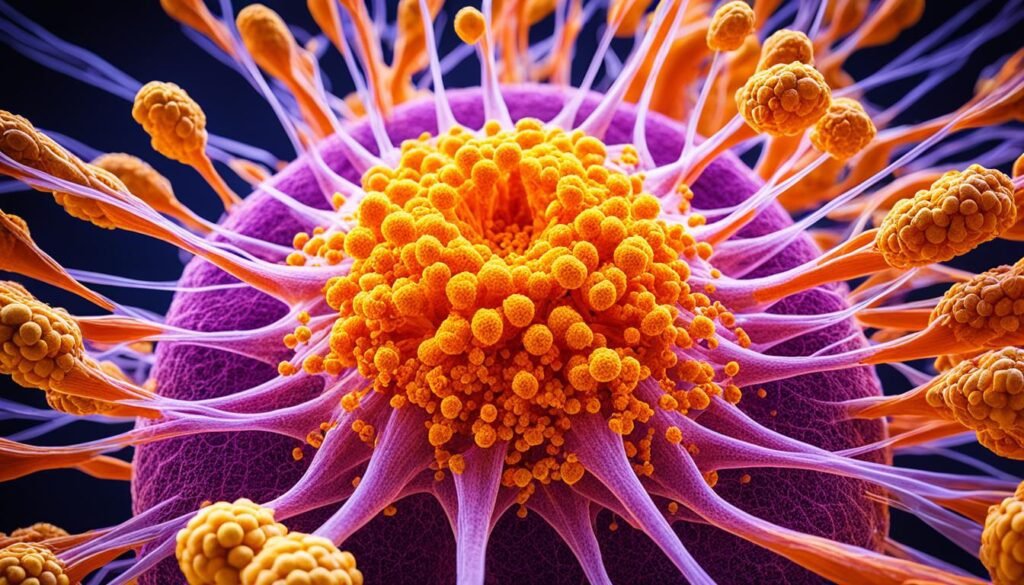
Curcumin, the active compound in turmeric, possesses remarkable properties that protect cells from damage and support overall cellular health.
One of the primary benefits of curcumin is its ability to activate proteins that delay cellular senescence, the process that leads to accelerated aging and disease progression. By preventing cellular senescence, curcumin helps promote longevity and maintain optimal cellular function.
Animal studies have demonstrated that curcumin is effective in combating cellular damage. It has been shown to increase lifespan and improve overall health and well-being.
Notably, curcumin intake is associated with a reduced risk of age-related cognitive decline. Studies have indicated that turmeric, with its abundance of curcumin, may help protect against cognitive impairments that commonly occur with aging.
Including turmeric in your diet or taking curcumin supplements can increase your intake of this beneficial compound and support cellular protection, longevity, and cognitive function.
Curcumin’s Cellular Protection: Summary
| Benefits | References |
|---|---|
| Delay cellular senescence | Study 1, Study 2 |
| Combat cellular damage | Study 3, Study 4 |
| Increase lifespan | Study 5, Study 6 |
| Reduced risk of age-related cognitive decline | Study 7, Study 8 |
Table: Summary of the benefits of curcumin’s cellular protection
With its potent cellular protective properties, curcumin offers numerous advantages for overall health, longevity, and cognitive function. Including turmeric in your diet or taking curcumin supplements may provide the cellular protection you need to support your well-being.
The Benefits of EGCG
Epigallocatechin gallate (EGCG), a polyphenol compound found in green tea, is known for its numerous health benefits. EGCG plays a vital role in improving mitochondrial function, which is crucial for energy production in our cells. By enhancing mitochondrial function, EGCG helps improve overall cell health and may contribute to slowing down the aging process.
Moreover, EGCG acts on pathways involved in aging, which can have a positive impact on various aspects of our health and well-being. It has been shown to support cellular repair mechanisms and protect against oxidative stress, which is a major contributor to aging.
One of the most fascinating benefits of EGCG is its ability to induce autophagy, a natural cellular process that removes damaged cellular material and promotes cell renewal. Autophagy plays a crucial role in maintaining cellular function and preventing the accumulation of damaged proteins and organelles.
EGCG stimulates autophagy, allowing cells to effectively eliminate damaged components and promoting overall cellular health.
Green tea consumption, rich in EGCG, has been associated with reduced risks of aging skin and hyperpigmentation caused by UV light exposure. The powerful antioxidant properties of EGCG help protect the skin from free radicals and oxidative damage, supporting a more youthful and radiant complexion.
In addition to its skin benefits, daily green tea consumption may also have positive effects on brain health. Studies suggest that EGCG can help suppress brain aging and reduce the risk of cognitive decline.
Overall, the inclusion of EGCG in our diets, primarily through green tea consumption, can provide a range of health benefits, including improved mitochondrial function, cellular protection, and support for healthy aging.
| Benefits of EGCG | How it Works |
|---|---|
| Improved Mitochondrial Function | Enhances energy production in cells, supporting overall cellular health. |
| Activation of Pathways Involved in Aging | Protects against oxidative stress and supports cellular repair mechanisms. |
| Induction of Autophagy | Promotes the removal of damaged cellular material and supports cell renewal. |
| Reduced Risks of Aging Skin | Protects against free radicals and oxidative damage, promoting a youthful complexion. |
| Brain Health Benefits | May help suppress brain aging and reduce the risk of cognitive decline. |
The Role of Collagen

Collagen is a crucial protein for maintaining the structure of our skin. It provides strength and elasticity, keeping our skin firm and supple. However, as we age, collagen production naturally slows down, leading to accelerated signs of aging such as wrinkles and sagging skin.
Fortunately, there are ways to support collagen production and maintain youthful skin. One option is to supplement with collagen peptides, which are bioactive forms of collagen that can be easily absorbed by the body. These supplements have shown promise in reducing signs of aging and improving overall skin health.
“Collagen peptides have shown promise in reducing signs of aging and improving skin health.”
Studies have shown that collagen supplementation can enhance skin hydration, increase skin elasticity, and reduce the appearance of wrinkles and fine lines. It helps to replenish the collagen levels in our skin, restoring its structural integrity and promoting a more youthful appearance.
Additionally, collagen supplements may also have positive effects on nail growth and strength. Collagen is a vital component of nails, and supplementing with collagen peptides can help strengthen brittle nails and promote healthy nail growth.
While more research is needed to fully understand the mechanisms and benefits of collagen supplementation, these findings suggest that incorporating collagen into your antiaging skincare routine may be beneficial. It is important to note that results may vary from person to person, and it’s always best to consult with a healthcare professional before starting any new supplement regimen.
| Benefit | Effect of Collagen Supplementation |
|---|---|
| Improved skin hydration | Collagen supplements can enhance skin moisture levels, leading to increased hydration and a more youthful complexion. |
| Reduced wrinkles and fine lines | Studies suggest that collagen supplementation can help reduce the appearance of wrinkles and fine lines, promoting smoother and younger-looking skin. |
| Enhanced skin elasticity | Collagen peptides support the production of elastin, a protein responsible for skin elasticity, thereby improving skin firmness and elasticity. |
| Promoted nail growth and strength | Collagen is an essential component of nails, and supplementing with collagen peptides can help strengthen brittle nails and promote healthier nail growth. |
It’s important to remember that collagen supplements work best when used in conjunction with a comprehensive skincare routine that includes proper hydration, sun protection, and a healthy diet rich in antioxidants and nutrients. Taking care of your skin from the inside out is key to maintaining a youthful, radiant complexion.
CoQ10 and Cellular Protection
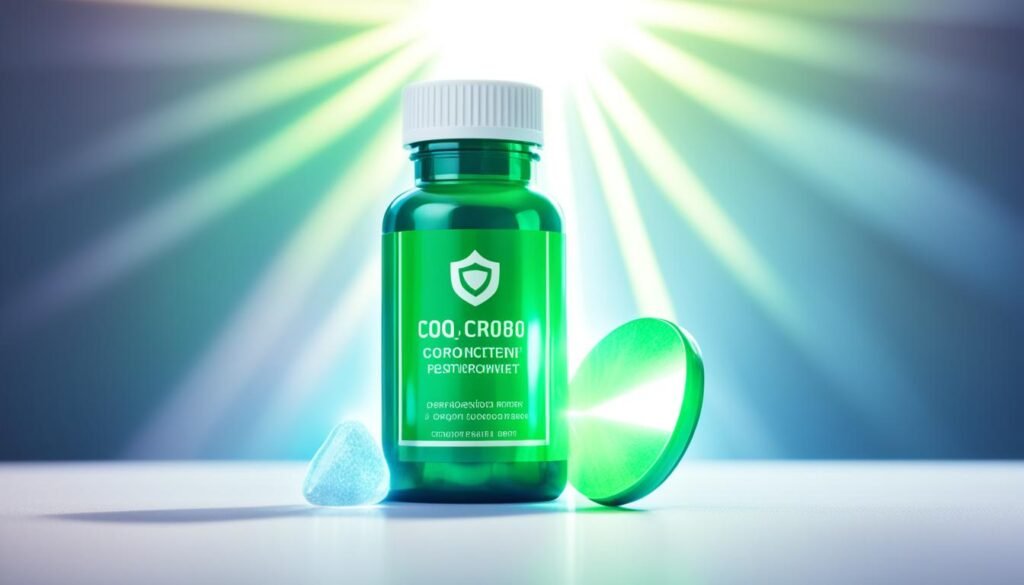
Coenzyme Q10 (CoQ10) is a natural antioxidant that plays an essential role in energy production and protects against cellular damage. As an antioxidant, CoQ10 helps neutralize harmful free radicals and reduce oxidative stress, a condition associated with aging and age-related diseases.
Supplementing with CoQ10 has been shown to have numerous health benefits, particularly in older adults. Research suggests that CoQ10 supplementation can improve overall quality of life, reduce hospital visits, and slow down physical and mental deterioration.
One of the major benefits of CoQ10 is its role in heart health. It has been found to reduce arterial stiffness, lower blood pressure, and prevent the buildup of cholesterol. These effects contribute to the maintenance of cardiovascular health and the reduction of the risk of heart disease.
“CoQ10 supplementation can improve overall quality of life, reduce hospital visits, and slow down physical and mental deterioration.”
To better understand the benefits of CoQ10, let’s take a closer look at its role in cellular protection:
CoQ10 and Oxidative Stress
Oxidative stress occurs when there is an imbalance between the production of free radicals and the body’s ability to neutralize them. Free radicals are highly reactive molecules that can damage cells and contribute to various health problems, including aging and age-related diseases.
CoQ10 acts as an antioxidant by donating electrons to free radicals, stabilizing them and preventing them from causing further damage. By reducing oxidative stress, CoQ10 helps protect cells from premature aging and promotes overall cellular health.
Furthermore, CoQ10 plays a crucial role in energy production within the mitochondria, the powerhouses of the cells. It is involved in the synthesis of adenosine triphosphate (ATP), which is the primary source of cellular energy. By supporting energy production, CoQ10 helps maintain optimal cellular function and vitality.
Moreover, CoQ10 has been found to enhance the activity of other antioxidants, such as vitamin E, further boosting the cellular defense against oxidative damage.
Overall, CoQ10 acts as a powerful ally in protecting cells from damage, promoting healthy aging, and supporting optimal cellular function.
To visualize the benefits of CoQ10 supplementation, here is a table summarizing its effects:
| Benefits of CoQ10 Supplementation |
|---|
| Improves overall quality of life |
| Reduces hospital visits |
| Slows down physical and mental deterioration |
| Reduces oxidative stress |
| Supports heart health by reducing arterial stiffness, lowering blood pressure, and preventing cholesterol buildup |
Incorporating CoQ10 into your supplement routine can help support your overall health and combat the effects of aging.
Next, let’s explore the importance of NAD+ and its role in healthy aging.
Boosting NAD+ Levels
Nicotinamide riboside (NR) and nicotinamide mononucleotide (NMN) are precursors to NAD+ (nicotinamide adenine dinucleotide). NAD+ levels decline with age and are associated with physical decline and age-related diseases.
Supplementing with NR and NMN can restore NAD+ levels and potentially reverse age-associated cellular changes.
While more research is needed, preliminary studies have shown promising results on increasing NAD+ levels and delaying age-related symptoms.
The Benefits of Crocin
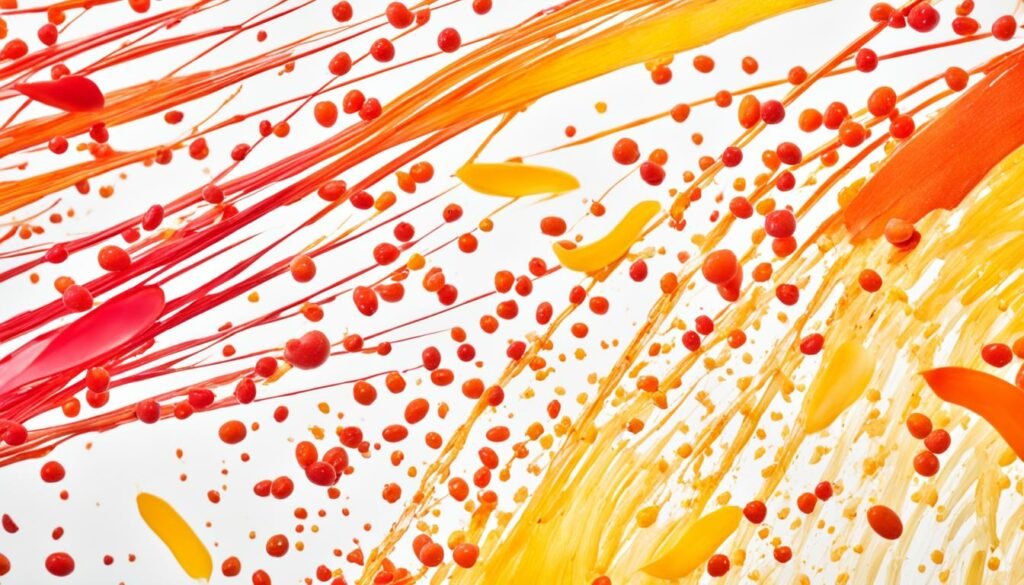
Saffron, known for its vibrant color and distinct flavor, contains a pigment called crocin that offers a range of health benefits. Rich in antioxidants, crocin has been associated with anti-inflammatory, antidepressant, and cognitive-enhancing properties.
One notable benefit of crocin is its ability to protect against age-related nerve damage. It inhibits the production of compounds that contribute to the aging process, thus preserving nerve function and reducing the risk of nerve-related conditions.
In addition to its neuroprotective effects, crocin also plays a role in promoting skin health. It shields human skin cells from inflammation and damage caused by harmful UV light, helping to maintain the integrity and resilience of the skin.
While saffron itself can be expensive, concentrated saffron supplements are readily available and can provide the benefits of crocin in a more affordable and accessible form.
Important Nutrients for Healthy Aging

As we age, it becomes increasingly important to nourish our bodies with the right nutrients to promote healthy aging. Certain vitamins and minerals play a critical role in maintaining our overall health and well-being. In this section, we will explore some of the key nutrients that are essential for healthy aging.
B Vitamins for Brain Function
B vitamins, particularly B12, are vital for brain function and have been linked to preventing cognitive impairment and depression. These vitamins help support the production of neurotransmitters, which are essential for proper brain health. Including sources of B vitamins such as fish, poultry, eggs, and leafy green vegetables in your diet can contribute to maintaining optimal brain function as you age.
Vitamin D for Bone Health
Vitamin D is crucial for maintaining strong bones and overall bone health. As we get older, our bodies may experience a decline in vitamin D production, making it important to obtain this nutrient through other means. Spending time in the sun and consuming foods rich in vitamin D, such as fatty fish, fortified dairy products, and egg yolks, can help support bone health and reduce the risk of fractures.
Calcium for Strong Bones and Teeth
Calcium is another essential nutrient for maintaining strong bones and teeth. As we age, our bones may become more brittle and susceptible to fractures. Adequate calcium intake can help prevent this. Dairy products, leafy greens, and fortified foods are excellent sources of calcium that can be incorporated into a balanced diet to support bone health.
Omega-3 Fatty Acids for Cognitive Function
Omega-3 fatty acids have been well-studied for their potential benefits in promoting cognitive function and reducing the risk of cognitive decline as we age. These healthy fats have anti-inflammatory properties that support brain health. Sources of omega-3 fatty acids include fatty fish like salmon and mackerel, as well as flaxseeds and walnuts.
Curcumin for Anti-Aging and Inflammation
Curcumin, a compound found in turmeric, has gained attention for its potential anti-aging and anti-inflammatory properties. Research suggests that curcumin may help combat age-related chronic inflammation and oxidative stress. While turmeric can be incorporated into cooking, curcumin supplements offer a concentrated dose of this beneficial compound.
Lutein for Eye Health
Lutein is an antioxidant that plays a crucial role in maintaining eye health, particularly as we age. It can help protect against age-related macular degeneration and cataracts. Leafy green vegetables such as spinach and kale are excellent sources of lutein that can be included in a well-balanced diet to support eye health.
Incorporating these important nutrients into your diet can contribute to healthy aging and overall well-being. By providing essential support to brain function, bone health, cognitive function, and eye health, these nutrients play a vital role in promoting a fulfilling and vibrant life as you age.
Conclusion
Taking recommended vitamins for antiaging skin care is essential for healthy aging and maintaining a youthful appearance. Antioxidants like selenium, vitamin E, and vitamin C play a crucial role in protecting the skin against sun damage and promoting overall skin health. These vitamins combat the effects of environmental stressors, repair free radicals, and prevent skin damage.
In addition to these essential vitamins, other supplements can support healthy aging. Curcumin, omega-3 fatty acids, and B vitamins have potential benefits for overall well-being. Curcumin provides cellular protection and helps delay aging, while omega-3 fatty acids have anti-inflammatory effects and improve cognitive function. B vitamins are crucial for brain health and may prevent cognitive decline.
To ensure optimal skin health and slow down the aging process, it is vital to maintain an adequate intake of these nutrients through diet or supplementation. Incorporating a balanced diet rich in fruits, vegetables, whole grains, and lean proteins can provide a wide range of vitamins and minerals. However, if dietary intake is insufficient, supplements can be a convenient option to bridge the gap and support healthy aging.
Remember, everyone’s nutritional needs may vary. It is advisable to consult with a healthcare professional or registered dietitian to determine the appropriate dosage of supplements based on individual factors such as age, gender, and overall health. By prioritizing proper nutrition and incorporating recommended vitamins and supplements, you can proactively care for your skin and promote healthy aging.
FAQ
What are the recommended vitamins for antiaging skin care?
The recommended vitamins for antiaging skin care include selenium, vitamin E, and vitamin C, which are antioxidants that protect against sun damage and promote skin health. Other supplements, such as curcumin, omega-3 fatty acids, and B vitamins, also have potential benefits for healthy aging.
What is the role of selenium in antiaging skin care?
Selenium is a mineral that helps protect the body from skin cancer caused by sun exposure and preserves tissue elasticity. It has been shown to provide protection against UV damage in animal studies, and while more research is needed in humans, these findings show promise for selenium in antiaging skin care.
How does vitamin E benefit the skin?
Vitamin E is considered the most important antioxidant for skin health. It protects cell membranes, reduces damage caused by sun exposure, and limits the production of cancer-causing cells. Applying vitamin E topically or consuming it through natural sources can improve skin texture and reduce wrinkles.
What is the role of vitamin C in antiaging skin care?
Vitamin C is a vital antioxidant that repairs free radicals and prevents them from causing damage to the skin. It decreases with UV exposure and exposure to city pollution. Although applying vitamin C topically can be challenging, consuming vitamin C-rich foods is essential to maintain adequate levels of this crucial antioxidant.
How does curcumin protect against cellular damage?
Curcumin, the active compound in turmeric, activates proteins that delay cellular senescence and prevent accelerated aging and disease progression. It has been shown to combat cellular damage and increase lifespan in animal studies. Increasing curcumin intake through dietary inclusion or supplementation can provide these cellular protective benefits.
What are the health benefits of EGCG found in green tea?
EGCG, a polyphenol compound found in green tea, improves mitochondrial function, acts on pathways involved in aging, and induces the removal of damaged cellular material. It is linked to reduced risks of aging skin and hyperpigmentation caused by UV light. Green tea consumption may also offer brain-aging suppression and stress reduction benefits.
How does collagen contribute to antiaging skin care?
Collagen is a crucial protein for maintaining skin structure, but its production slows down with age, which leads to accelerated signs of aging like wrinkles. Supplementing with collagen has shown promise in reducing signs of aging, improving skin hydration, and promoting nail growth.
What is the role of CoQ10 in cellular protection?
CoQ10 is a natural antioxidant that plays a crucial role in energy production and protects against cellular damage. Supplementing with CoQ10 can improve overall quality of life, reduce oxidative stress, and slow physical and mental deterioration in older adults. It has also shown benefits for heart health.
How do NR and NMN help boost NAD+ levels?
NR and NMN are precursors to NAD+ (nicotinamide adenine dinucleotide), a molecule that declines with age and is associated with physical decline and age-related diseases. Supplementing with NR and NMN can restore NAD+ levels and potentially reverse age-associated cellular changes, although more research is needed to fully understand these effects.
What are the benefits of crocin found in saffron?
Crocin, a pigment found in saffron, offers multiple health benefits, including anti-inflammatory, antidepressant, and cognitive benefits. It prevents age-related nerve damage, protects human skin cells from inflammation and UV damage. Concentrated saffron supplements can provide the benefits of crocin.
What are some important nutrients for healthy aging?
Important nutrients for healthy aging include B vitamins, which support brain function and may help prevent cognitive impairment and depression. Vitamin D is essential for bone health, while calcium is necessary for strong bones and teeth. Omega-3 fatty acids have anti-inflammatory effects and can improve cognitive function. Curcumin has potential anti-aging and anti-inflammatory properties, and lutein supports eye health.
How can vitamins help with antiaging skin care?
Taking recommended vitamins for antiaging skin care can help maintain a youthful appearance and combat the effects of aging. Selenium, vitamin E, and vitamin C are antioxidants that protect against sun damage and promote skin health. Other supplements, such as curcumin, omega-3 fatty acids, and B vitamins, have potential benefits for overall skin health and healthy aging.

